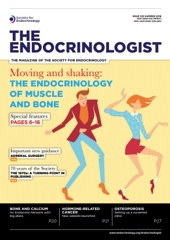Our genetic constitution is a key factor contributing to our individual risk and prognosis for many medical conditions. Some disorders already have a well-established genetic cause: for example, the receptor tyrosine kinase (RET) proto-oncogene and multiple endocrine neoplasia type 2. In contrast, in other conditions we have yet to understand the full implications of genetic contributions.
Historically, we have taken a family history to look for familial patterns in conditions, but this relies on relatives communicating their medical history within the family, and will be uninformative for cases which are apparently sporadic.
We have become increasingly aware that it is rarely a single gene that causes a disease. Multiple factors including our genome (the collection of genes and the DNA between the genes) and environmental factors all play a role. Genomics is the discipline encompassing the study, sequencing and analysis of the genome and interactions between genes and the application of this knowledge to medicine. Pharmacogenomics is the customisation of medical therapies to the patient’s individual genetic makeup.
The Human Genome Project, which took 13 years, completed the sequencing of the reference genome in April 2003.1 This remains one of the largest scientific ventures in history. The subsequent genomic revolution has not only led to advances in medicine but affects many other areas of our lives, e.g. veterinary sciences and agriculture. Genetic research has since progressed to the point where rapid sequencing of DNA is now technically achievable in a single day, albeit rarely applicable in routine practice.
IMPACT ON CURRENT PRACTICE
Within our specialty of diabetes and endocrinology, you do not have to look far to come across genomics and pharmacogenomics already embedded in our current clinical practice.2
For example, we know that patients diagnosed with maturity onset diabetes of the young due to a HNF1A mutation are extremely sensitive to sulphonylureas.3 Investigation of the underlying aetiology of medullary thyroid cancer identifies that up to one-third of cases may have a germline mutation, and this affects the information we give to the individual and their family for screening and further management. Likewise, 10–20% of apparently isolated phaeochromocytomas and paragangliomas have a germline mutation in one of nine identified genes.
THE 100,000 GENOMES PROJECT
The 100,000 Genomes Project is underway, aiming to sequence the genetic code of patients and their family members, looking at rare inherited disorders, specific malignancies and infectious diseases.4 The first group typically will have none of the known genetic causes on testing or be very heterogeneous, with too many different causative genes involved for testing to be practical in routine service. The table lists the diabetes and endocrinology conditions that are eligible for the project, as listed in the project information in January 2016.5
The project’s aim is to identify pathogenic genetic sequence changes leading to more accurate diagnoses, personalised treatments and more predictable outcomes, changing the application of genomic medicine. Clinicians within the NHS can identify patients who may be eligible and refer them to their local genomic medicine centre. This is available through the Genomics England website,4 which also includes a link to enable an application to be made to nominate a new rare disease (incidence not greater than 1 in 2,000).5
DRAWING CONCLUSIONS
Within our specialty, we already have many multidisciplinary clinics which manage patients jointly with genetics teams. Further advances in genomics are helping with new diagnostic, investigatory and therapeutic strategies in many conditions. In the future, all clinicians will need to become increasingly comfortable with embedding genomics into our day-to-day clinical practice, to tailor patients’ management plans to deliver more personalised medical care.
Christine May
Neil Gittoes
Centre for Endocrinology, Diabetes and Metabolism, Birmingham Health Partners, Birmingham
Trevor Cole
Birmingham Women’s Hospital, Birmingham Health Partners
The authors are all members of the Genomics in Mainstream Medicine Working Group (http://bit.ly/1Takn6y).
The 100,000 Genomes Project: www.genomicsengland.co.uk
PHG Foundation: www.phgfoundation.org/education
Health Education England (Genomics Education Programme): www.genomicseducation.hee.nhs.uk
REFERENCES
- Tripp S & Gruber M 2011 Economic Impact of the Human Genome Project http://bit.ly/1VWRTDE.
- May CJH et al. 2015 Genomics in Mainstream Medicine: Endocrinology, Diabetes and Genomics www.phgfoundation.org/file/17032.
- International Diabetes Federation 2011 Global IDF/ISPAD Guideline for Diabetes in Childhood and Adolescence http://bit.ly/1SD73HL.
- Genomics England 2015 The 100,000 Genomes Project www.genomicsengland.co.uk/the-100000-genomes-project.
- Genomics England 2015 Nominating a Disease for Inclusion in the 100,000 Genomes Project http://bit.ly/1TAVxfY.





